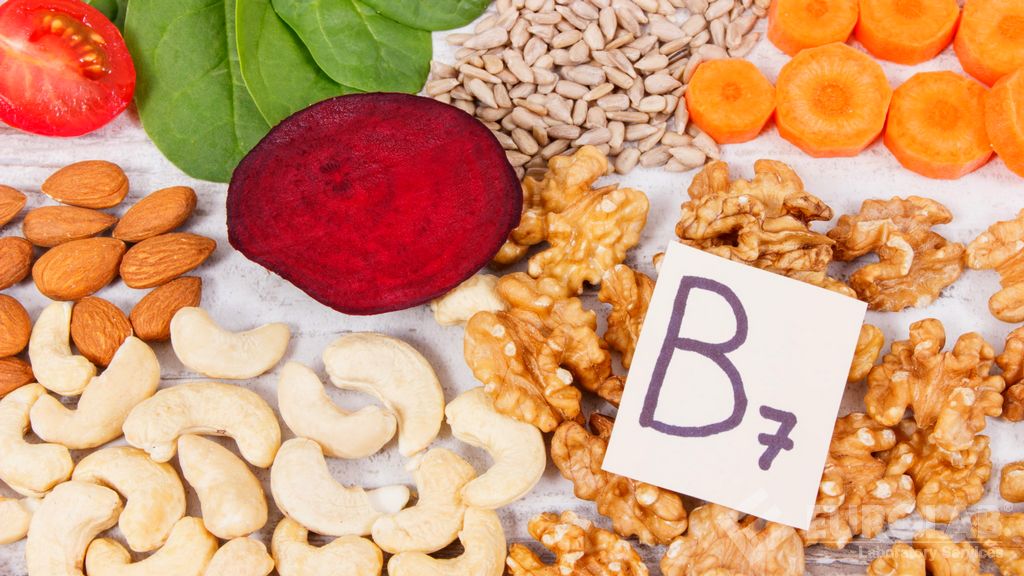Introduction
Vitamin B7, also known as biotin, is a water-soluble B vitamin that plays a crucial role in maintaining overall health. It is well-recognized for its contributions to skin, hair, and nail health, but its benefits extend far beyond appearances. In this comprehensive guide, we will explore the various aspects of vitamin B7 (biotin), including its sources, functions, benefits, recommended daily intake, potential risks of deficiency or excess, and how to ensure you get an adequate and balanced supply of this essential nutrient.
Understanding Vitamin B7 (Biotin)
Vitamin B7, commonly referred to as biotin, is a water-soluble B vitamin. It is an essential nutrient, which means that the body needs it to function properly but cannot produce it on its own, requiring a dietary intake. Biotin is vital for various metabolic processes, particularly those related to the breakdown of macronutrients (carbohydrates, fats, and proteins) for energy and the maintenance of healthy skin, hair, and nails.
Sources of Biotin
Biotin is found in a variety of foods, and it can also be synthesized by the bacteria in the gut. Dietary sources of biotin include
- Eggs: Egg yolks are a rich source of biotin.
- Meat: Organ meats like liver, as well as pork, beef, and poultry, contain biotin.
- Dairy Products: Milk, cheese, and yogurt provide biotin.
- Legumes: Nuts, seeds, and certain legumes like peanuts and soybeans contain biotin.
- Fish: Salmon, trout, and sardines are sources of biotin.
- Vegetables: Cauliflower, sweet potatoes, and spinach are some vegetable sources of biotin.
- Whole Grains: Whole wheat products, such as bread and cereals, contain biotin.
Additionally, biotin is produced by beneficial bacteria in the gut. The body can absorb both dietary biotin and biotin synthesized by gut bacteria.
Functions of Biotin
Biotin plays several essential roles in the body
- Energy Metabolism: Biotin is a cofactor for various enzymes involved in the breakdown of carbohydrates, fats, and proteins. This process generates energy for the body.
- Healthy Skin, Hair, and Nails: Biotin is often associated with maintaining the health of the skin, hair, and nails. It is essential for the synthesis of keratin, a protein that forms the structural basis of these tissues.
- Cell Growth and Repair: Biotin contributes to cell growth and repair processes in the body, including those necessary for the regeneration of skin and hair cells.
- Fatty Acid Synthesis: Biotin is required for the synthesis of fatty acids, which are essential components of cell membranes and play various roles in the body.
- Blood Sugar Regulation: Biotin is involved in the regulation of blood sugar levels by facilitating the metabolism of glucose.
- Neurological Health: Biotin may support neurological health, although more research is needed to fully understand its role in this regard.
Benefits of Biotin
Biotin offers a range of benefits for human health and well-being
Healthy Skin, Hair, and Nails
One of the most well-known benefits of biotin is its role in promoting healthy skin, hair, and nails. Biotin is often included in supplements and beauty products for this reason. It supports the production of keratin, which is vital for the structure and strength of these tissues.
Energy Metabolism
Biotin is essential for energy metabolism. It helps the body efficiently convert carbohydrates, fats, and proteins into usable energy, ensuring that you have the stamina and vitality needed for daily activities.
Fatty Acid Synthesis
Biotin contributes to the synthesis of fatty acids, which are crucial for cell membrane integrity and various physiological processes. A balanced intake of biotin supports overall cellular health.
Blood Sugar Regulation
Biotin plays a role in the metabolism of glucose, helping to regulate blood sugar levels. This can be particularly important for individuals with diabetes or those at risk of developing the condition.
Wound Healing and Cell Regeneration
Biotin is necessary for cell growth and repair processes, making it essential for wound healing and tissue regeneration. It helps the body recover from injuries or surgery more effectively.
Neurological Health Support
While more research is needed, some studies suggest that biotin may have a role in supporting neurological health, including cognitive function and brain health.
Pregnancy Support
Biotin is crucial during pregnancy as it supports the development of the baby’s organs and overall growth. Ensuring adequate biotin intake is particularly important for expectant mothers.
Treatment of Biotinidase Deficiency
Biotinidase deficiency is a rare genetic disorder that impairs the body’s ability to recycle biotin. In such cases, biotin supplementation is essential and can prevent neurological and other health issues.
Recommended Daily Intake
The recommended daily intake of biotin varies depending on age, sex, and life stage. It is typically expressed in micrograms (mcg). Here are the recommended dietary allowances (RDAs) for biotin:
- Infants (0-6 months): 5 mcg
- Infants (7-12 months): 6 mcg
- Children (1-3 years): 8 mcg
- Children (4-8 years): 12 mcg
- Children (9-13 years): 20 mcg
- Adolescents (14-18 years): 25 mcg
- Adults (19 years and older): 30 mcg
- Pregnant women (14-18 years): 30 mcg
- Pregnant women (19 years and older): 30 mcg
- Lactating women (14-18 years): 35 mcg
- Lactating women (19 years and older): 35 mcg
Maintaining an adequate intake of biotin within these recommended guidelines is essential for reaping its benefits and supporting overall health.
Risks of Deficiency
While biotin deficiency is relatively rare, it can lead to various health issues, including:
Skin Problems
Biotin deficiency can result in skin issues such as rashes, acne, and dermatitis.
Hair and Nail Problems
Inadequate biotin levels can lead to brittle nails, hair loss, and changes in hair color.
Neurological Symptoms
Severe biotin deficiency can cause neurological symptoms, including depression, lethargy, hallucinations, and numbness in the extremities.
Metabolic Disturbances
Biotin deficiency can interfere with metabolic processes, potentially leading to elevated blood sugar levels and insulin resistance.
Developmental Issues in Infants
Infants born to mothers with a biotin deficiency can experience developmental problems, including poor muscle tone and delayed growth.
Risks of Excess
Biotin is generally considered safe, and there are no established risks associated with excessive biotin intake from food sources. However, excessive intake of biotin supplements can lead to potential issues, including:
Misleading Lab Test Results
High-dose biotin supplements can interfere with certain laboratory tests, leading to inaccurate results. This can be a concern if a healthcare provider is unaware of biotin supplementation.
Gastrointestinal Symptoms
In some cases, excessive biotin intake from supplements can cause gastrointestinal symptoms such as nausea and diarrhea.
Acne Flare-Ups
Rarely, high-dose biotin supplements have been associated with acne flare-ups in some individuals.
Allergic Reactions
While rare, allergic reactions to biotin supplements have been reported in a small number of cases.
How to Ensure an Adequate Biotin Intake
To maintain an optimal balance of biotin for your health, consider the following tips
- Eat a Balanced Diet: Consume a variety of biotin-rich foods, including eggs, meat, dairy products, legumes, nuts, and vegetables.
- Avoid Excessive Supplementation: Be cautious with biotin supplements, especially if you already have a balanced diet. Consult a healthcare professional for guidance on supplement use.
- Hair, Skin, and Nail Supplements: If you are using biotin supplements for hair, skin, or nail health, use them as directed, and discuss their use with a healthcare provider if you have any concerns.
- Be Aware of Potential Interference with Lab Tests: If you are taking high-dose biotin supplements, inform your healthcare provider, as these supplements can interfere with certain laboratory tests.
- Seek Professional Guidance for Specific Health Concerns: If you have specific health conditions or concerns about biotin intake, consult a healthcare professional or a registered dietitian for personalized guidance.
Conclusion
Vitamin B7, or biotin, is an essential nutrient that plays a pivotal role in maintaining overall health. It supports healthy skin, hair, and nails, energy metabolism, wound healing, and more. To reap the benefits of biotin while avoiding potential risks, it’s essential to maintain a balanced and varied diet and be cautious with supplementation, especially at high doses. Understanding the significance of biotin and its role in the body allows individuals to make informed choices that promote their overall well-being and health.
- The Comprehensive Guide to the Benefits of Vitamin B7 (Biotin) - October 24, 2023
- Comprehensive Guide on the Benefits of Damiana Supplements - July 11, 2023

